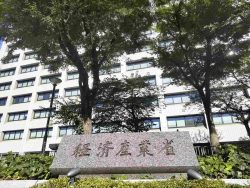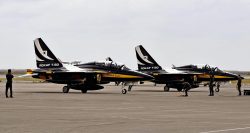Hierarchical nature of SDF partly behind captain’s leak of secrets to former superior officer
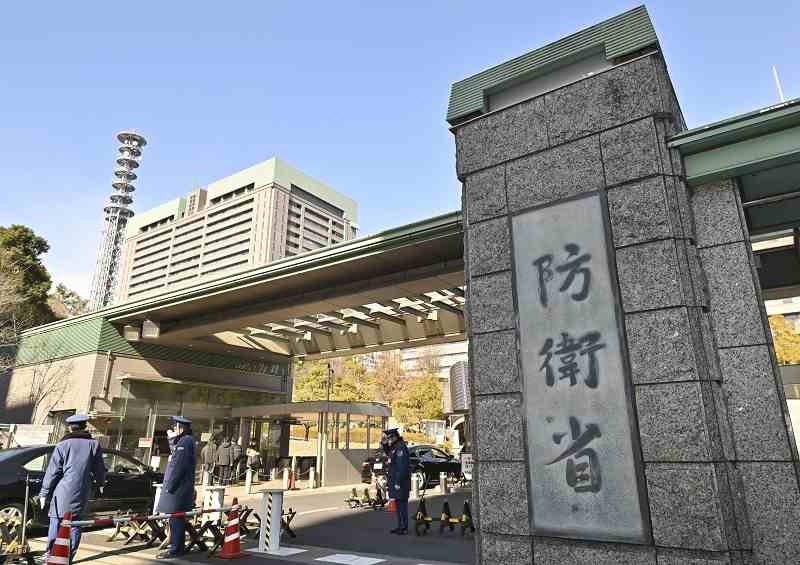
The main gate of the Defense Ministry is seen in Shinjuku Ward, Tokyo.
18:27 JST, December 27, 2022
For the first time under the Law on the Protection of Specially Designated Secrets, an alleged leak of such secrets has been revealed.
Specially designated secrets are defined as classified information that if leaked would seriously hinder national security.
The alleged leak at issue involves Maritime Self-Defense Force Capt. Takashi Inoue, who had headed the MSDF’s only intelligence unit. The 54-year-old captain, disciplinary discharged by the Defense Ministry on Monday, allegedly leaked the secrets in 2020 to a retired vice admiral who had served in key SDF posts.
Looming in the background of this incident is the organizational nature of the Self-Defense Forces, which attaches importance to the execution of its duties in a top-down fashion. Furthermore, officers on active duty often find it difficult to keep their distance from retired officers and these ties can engender risks.
“For having significantly lost relevant nations’ confidence, we deeply apologize,” MSDF Chief of Staff Adm. Ryo Sakai said during a specially arranged press conference in Tokyo on Monday.
It was only in 2007 that a similar incident rattled Japan-U.S. relations, when an MSDF officer leaked secret information about an Aegis-equipped destroyer. The MSDF lieutenant commander in question was found to have copied classified information containing data about the U.S.-supplied Aegis destroyer’s functions and sent it to an instructor at the MSDF’s First Service School without following proper procedures.
The lieutenant commander was arrested on suspicion of violating the secrecy law in accordance with the Japan-U.S. Mutual Defense Assistance Agreement.
The MSDF often engages in joint activities with the U.S. Navy, so it had worked to prevent a recurrence of such incidents.
This time, however, Inoue was a commander of the Fleet Intelligence Command.
“While in a position that requires a higher level of awareness about the protection of secrets, he lacked compliance with the law,” Sakai said. “His actions must not be tolerated.”
Requests
According to sources, the incident started around January 2020 when a retired vice admiral who as commander in chief of the Self Defense Fleet was Inoue’s superior officer, asked the captain to brief him on national security situations.
While the MSDF chief of staff holds the rank of admiral, the rest of the MSDF is headed by vice admirals, followed by rear admirals, then captains.
The retired vice admiral asked Inoue for a briefing, saying he was often invited to give lectures. The retired office had made similar requests to others, including a commanding officer on active duty.
Partly because Inoue had received instructions from a commanding officer to give the retired vice admiral a briefing, Inoue invited the retired officer to his unit’s facility and briefed him on the situations, including allegedly divulging classified information.
Inoue, having admitted to the alleged leak during an investigation by the Defense Ministry, reportedly said he was “in awe” of the retired vice admiral and had “wanted to give him reliable explanations because he was once in a high position” in the MSDF.
Inoue also reportedly said he was instructed by the Self-Defense Fleet headquarters to give the retired vice admiral the briefing.
“These facts made the captain unable to make a correct judgment and caused him to lose sense of normal conduct,” a senior ministry official said.
The ministry said the leaked specially designated secrets involved “information collected regarding the situation surrounding Japan,” though it couldn’t talk about the details further.
Repercussions
In response to the latest incident, the ministry set up a panel to discuss measures to prevent a recurrence and is putting countermeasures in place. The MSDF held an extraordinary meeting with all general officers and instructed them to ensure that information is protected. The MSDF will also make sure that retired officers do not request information from ministry personnel without due consideration.
The incident, however, is likely to have lasting repercussions.
“Naturally, the details of the latest case will be explained to the relevant nations,” Sakai said.
The ministry plans to purchase U.S.-made Tomahawk cruise missiles to possess counterattack capabilities that could destroy an enemy’s missile launch sites and other targets for self-defense purposes. When asked at the press conference about the impact of the latest incident on the introduction of U.S.-made equipment, Sakai did not elaborate.
“The extent of the impact is hard to gauge at this point,” he said.
Top Articles in Politics
-
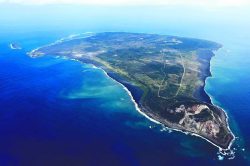
Japan Seeks to Enhance Defense Capabilities in Pacific as 3 National Security Documents to Be Revised
-

Japan Tourism Agency Calls for Strengthening Measures Against Overtourism
-

Japan’s Prime Minister: 2-Year Tax Cut on Food Possible Without Issuing Bonds
-
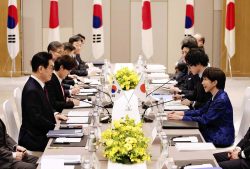
Japan-South Korea Leaders Meeting Focuses on Rare Earth Supply Chains, Cooperation Toward Regional Stability
-
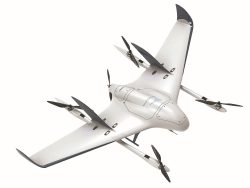
Japanese Government Plans New License System Specific to VTOL Drones; Hopes to Encourage Proliferation through Relaxed Operating Requirements
JN ACCESS RANKING
-

Univ. in Japan, Tokyo-Based Startup to Develop Satellite for Disaster Prevention Measures, Bears
-

JAL, ANA Cancel Flights During 3-day Holiday Weekend due to Blizzard
-

China Confirmed to Be Operating Drilling Vessel Near Japan-China Median Line
-

China Eyes Rare Earth Foothold in Malaysia to Maintain Dominance, Counter Japan, U.S.
-

Japan Institute to Use Domestic Commercial Optical Lattice Clock to Set Japan Standard Time


